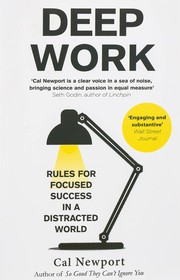
Deep Work
Author : Cal Newport
Deep work = uninterrupted periods of hyper-focus. Unless you're Buddha, you're probably not here yet.
ISBN : 1455586692
Personal Rating : 8.6
Notes
- 🧠 Core Idea
- - Deep work = focused, distraction-free work that pushes your cognitive limits.
- - It’s how you create high-value output and develop meaningful skills.
- - In contrast, shallow work = easy, logistical, or repetitive tasks that don’t require deep focus.
- - In today’s world of distractions, deep work is a superpower for success.
- 💡 Why Deep Work Matters
- - Modern workers are constantly distracted by notifications, emails, and multitasking.
- - Shallow work dominates most people’s schedules, leaving little room for real progress.
- Deep work allows you to:
- => Learn faster and build rare skills.
- => Produce higher-quality results in less time.
- => Feel greater satisfaction and purpose.
- ⚙️ The Two Core Principles
- 1️⃣ Deep Work Is Valuable
- - In the information age, those who can focus deeply thrive.
- - High-quality work = time spent × intensity of focus.
- - The ability to focus intensely is rare but crucial.
- 2️⃣ Deep Work Is Meaningful
- - Deep focus gives work a sense of craftsmanship and pride.
- - It helps you connect with your purpose and reach “flow” states.
- 🧭 The Four Rules of Deep Work
- Rule #1: Work Deeply
- - Willpower is limited — structure your environment to support focus.
- - Create rituals that minimize distractions (set start/end times, clear workspace).
- - Work in defined, intense sessions instead of all day long.
- - Choose a “depth philosophy” that fits your life:
- => Monastic (cut off all distractions completely).
- => Bimodal (alternate between deep and shallow periods).
- => Rhythmic (schedule deep work daily).
- => Journalistic (fit deep work wherever possible).
- Rule #2: Embrace Boredom
- - Train your brain to tolerate boredom instead of reaching for your phone.
- - Don’t switch tasks when things get dull; learn to stay with the discomfort.
- - Schedule internet or social media use intentionally, not habitually.
- Rule #3: Quit Social Media
- - Be selective with your digital tools.
- - Ask: Does this tool bring substantial benefit to my goals?
- - If not, eliminate it or limit its usage strictly.
- - The goal: reduce mental clutter and regain focus.
- Rule #4: Drain the Shallows
- - Schedule your entire day — even breaks — to stay intentional.
- - Prioritize tasks that matter; minimize meetings, emails, and “busy work.”
- Set clear boundaries:
- => End work at a fixed time each day.
- => Say “no” to shallow commitments that don’t move you forward.
- 🔄 Key Strategies & Techniques
- - Time-blocking: Plan every hour of your day for maximum control.
- - Shutdown ritual: End each workday with a routine to signal your brain to rest.
- - Focus sprints: 60–90 minutes of uninterrupted deep work with breaks.
- - Attention residue: Avoid context-switching; it lowers focus quality.
- 🧘 Mindset Shifts
- - Busyness ≠ productivity.
- - Depth brings fulfillment; shallow tasks drain meaning.
- - To do deep work, you must protect your time ruthlessly.
- - The ability to concentrate is a skill — train it deliberately.
- 🏁 Key Takeaways
- - Deep work is rare, valuable, and meaningful — cultivate it deliberately.
- - Eliminate distractions, schedule focus time, and prioritize meaningful output.
- - Shallow work is unavoidable but should be minimized and contained.
- - Mastering deep work creates a clear competitive advantage in life and career.
No comments yet! be the first to comment!